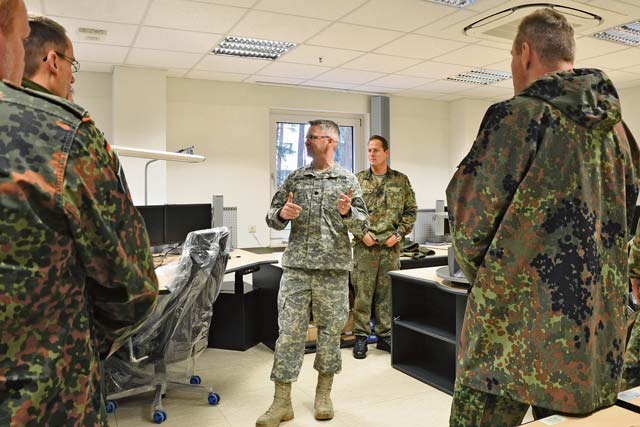
Capt. Daniel McCarey is posted to Germany, yet rarely sees fellow American Soldiers.
McCarey, a U.S. exchange officer at the German Armed Forces’ military police command in Hannover, Germany, recently brought 27 German military police troops to U.S. Army Garrison Rheinland-Pfalz, where they met with U.S. military police, criminal investigators and detention specialists.
The three-day visit served as an efficient way for allies to interact and learn from each other.
“There is not a lot of American contact in German life,” said McCarey, who grew up bilingual as a son of a German mother and a U.S. Army Soldier. “I think it gives them a good idea of what Americans do.”
McCarey, who is five months into a two-year assignment working with the German MPs, last served in Stuttgart in 2007. He was raised in Germany and attended German schools, so he’s comfortable in his current role. Still, it’s much different than a regular overseas assignment.
“It’s crazy, because you don’t work with any Americans on a day-to-day basis,” McCarey said. “I am not on a U.S. base; there is no PX, no commissary, no APO box.”
A good partnership program is based upon the evaluation of the partner unit’s practices, which can be adopted to the organization’s concepts, said 2nd Lt. Jan Oswald, a German MP who shares an office with McCarey.
“He is full of ideas and always tries to reach a goal,” said Oswald of his American colleague. “You learn a lot from each other, especially many cultural aspects, which can be so different.”
For MPs, knowing how allied forces operate offers both nations opportunities to develop, Oswald said.
Lt. Col. George Brown, U.S. Army Garrison Rheinland-Pfalz’s emergency services director, first learned of the exchange program during a visit last year to the German military police school in Hannover.
“If we make sure that our missions and support are in line and parallel to each other, we are stronger than we are individually,” Brown said. “This open relationship with each other is certainly mutually beneficial to both of our organizations.”
During their visit to the KMC, the German MPs visited the emergency services directorate at Rhine Ordnance Barracks, the Criminal Investigation Command at Kleber Kaserne, and the U.S. Army Regional Correctional Facility-Europe in Mannheim.
“It will be up to whatever the Germans take from that (visit) and maybe develop into some of their own courses of action in their army,” McCarey said.


